六级实时阅读之奥巴马与罗姆尼的对骂
- 格式:docx
- 大小:87.12 KB
- 文档页数:7
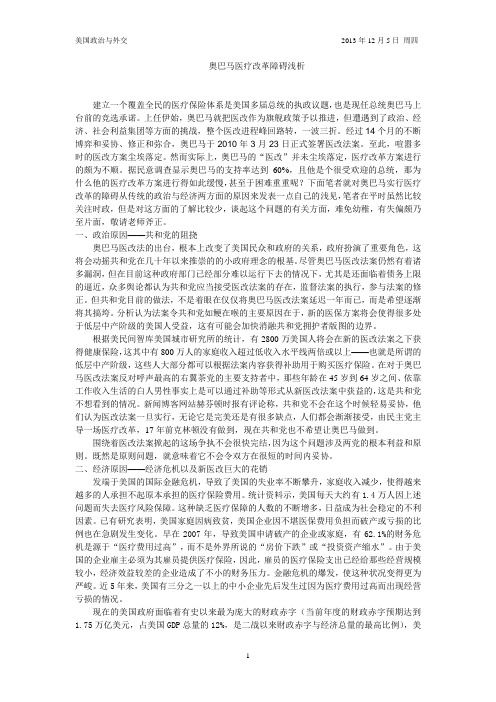
奥巴马医疗改革障碍浅析建立一个覆盖全民的医疗保险体系是美国多届总统的执政议题,也是现任总统奥巴马上台前的竞选承诺。
上任伊始,奥巴马就把医改作为旗舰政策予以推进,但遭遇到了政治、经济、社会利益集团等方面的挑战,整个医改进程峰回路转,一波三折。
经过14个月的不断博弈和妥协、修正和弥合,奥巴马于2010年3月23日正式签署医改法案。
至此,喧嚣多时的医改方案尘埃落定。
然而实际上,奥巴马的“医改”并未尘埃落定,医疗改革方案进行的颇为不顺。
据民意调查显示奥巴马的支持率达到60%,且他是个很受欢迎的总统,那为什么他的医疗改革方案进行得如此缓慢,甚至于困难重重呢?下面笔者就对奥巴马实行医疗改革的障碍从传统的政治与经济两方面的原因来发表一点自己的浅见,笔者在平时虽然比较关注时政,但是对这方面的了解比较少,谈起这个问题的有关方面,难免幼稚,有失偏颇乃至片面,敬请老师斧正。
一、政治原因——共和党的阻挠奥巴马医改法的出台,根本上改变了美国民众和政府的关系,政府扮演了重要角色,这将会动摇共和党在几十年以来推崇的的小政府理念的根基。
尽管奥巴马医改法案仍然有着诸多漏洞,但在目前这种政府部门已经部分难以运行下去的情况下,尤其是还面临着债务上限的逼近,众多舆论都认为共和党应当接受医改法案的存在,监督法案的执行,参与法案的修正。
但共和党目前的做法,不是着眼在仅仅将奥巴马医改法案延迟一年而已,而是希望逐渐将其搞垮。
分析认为法案令共和党如鲠在喉的主要原因在于,新的医保方案将会使得很多处于低层中产阶级的美国人受益,这有可能会加快消融共和党拥护者版图的边界。
根据美民间智库美国城市研究所的统计,有2800万美国人将会在新的医改法案之下获得健康保险,这其中有800万人的家庭收入超过低收入水平线两倍或以上——也就是所谓的低层中产阶级,这些人大部分都可以根据法案内容获得补助用于购买医疗保险。
在对于奥巴马医改法案反对呼声最高的右翼茶党的主要支持者中,那些年龄在45岁到64岁之间、依靠工作收入生活的白人男性事实上是可以通过补助等形式从新医改法案中获益的,这是共和党不想看到的情况。

奥巴马罗姆尼第一场电视辩论-中文稿时间:2012年10月3日地点:科罗拉多州,丹佛市,丹佛大学玛格里斯运动场主持人:美国公共广播公司(PBS)“新闻时间”主持人吉姆·莱雷尔(Jim Lehrer)莱雷尔:晚上好。
这里是科罗拉多州丹佛市的丹佛大学玛格里斯运动场。
我是美国公共广播公司《新闻时间》节目主持人吉姆·莱雷尔。
欢迎大家来到2012年总统大选第一次辩论会。
今天辩论双方是民主党候选人、现任总统巴拉克·奥巴马和共和党候选人、前马萨诸塞州州长米特·罗姆尼。
本场以及后面的三场辩论--两场总统辩论和一场副总统辩论--是由总统辩论委员会资助的。
今天晚上的90分钟辩论将围绕国内议题、根据总统辩论委员会规划的形式进行。
辩论由六个部分组成,每个部分大约15分钟。
在每个部分里,辩论双方各花两分钟回答第一个问题,然后就该部分其余问题进行自由辩论。
很多人士通过互联网或其他途径就每部分要讨论的题目提出了各种建议,但是这些议题是由我来挑选的。
在此我声明,这些议题并未提交辩论委员会或候选人筛选。
提前声明,三个部分关于经济议题,其余三个分别是关于医疗服务、政府功能和社会治理议题的。
每个部分都会强调辩论双方的不同意见、具体想法和政策选择。
辩论双方还将各有两分钟的结辩。
现场观众已承诺保持安静。
辩论时不要有喝彩、掌声、嘘声以及其他分散注意力的噪声,确保大家能够把注意力集中到聆听候选人的发言上。
现在,整个辩论会只有现在才允许发出与辩论无关的声音:热烈欢迎奥巴马总统和罗姆尼州长。
(欢呼。
掌声)欢迎你们,两位先生!现在开始第一部分,辩论经济议题。
关于如何创造就业机会,两位主要有什么不同呢?你们都将有两分钟时间陈述观点。
根据抽签顺序,您先请,总统先生。
创造就业机会奥巴马:好的。
谢谢你给我这个机会,吉姆。
我还想感谢罗姆尼州长和丹佛大学的热情。
今晚我想说的很多,但其中最重要的一点,就是20年前米歇尔·奥巴马同意嫁给我,使我成为世界上最幸运的人。
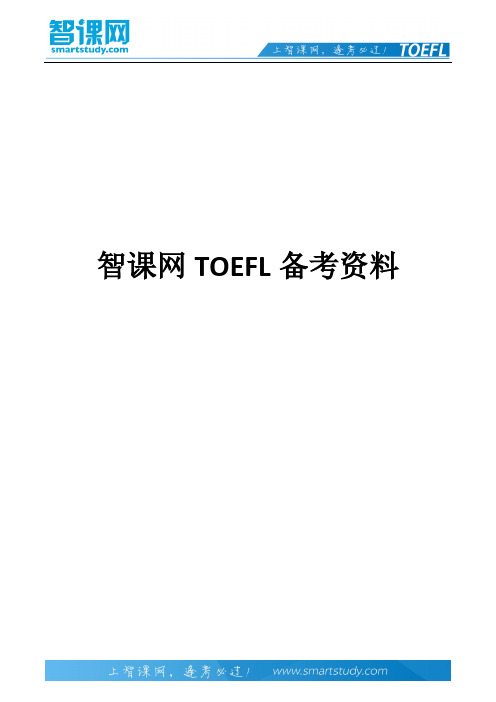
智课网TOEFL备考资料奥巴马医改的利弊一托福阅读机经背景Since enrollment began in the new U.S. health care program known as "Obamacare" last week, thousands of uninsured Americans have been signing up for coverage - even while Congressional opponents have partially shut down the government in a bid to repeal the law. This initial success at expanding coverage could end up alienating the vast majority of Americans by significantly raising their healthcare costs.被称为“奥巴马医保”的美国新平价医保计划上星期开始接受投保。
尽管国会反对派为了废除这项法案而使政府部分停摆,仍有成千上万没有医保的美国人报名参保。
虽然扩大医保涵盖范围的努力初战告捷,但很可能招致美国多数人的不满,因为平价医保导致他们的医疗开支大幅增加。
The Affordable Care Act - popularly known as "Obamacare" - makes it possible now for James Matthews to get coverage through the expanded federal Medicaid program for low income families - even though he has been diagnosed with diabetes.平价医保法案--也就是人们口中的奥巴马医保--扩大了联邦政府为低收入家庭设立的医疗补助计划,身患糖尿病的詹姆士·马修斯现在有可能参保了。
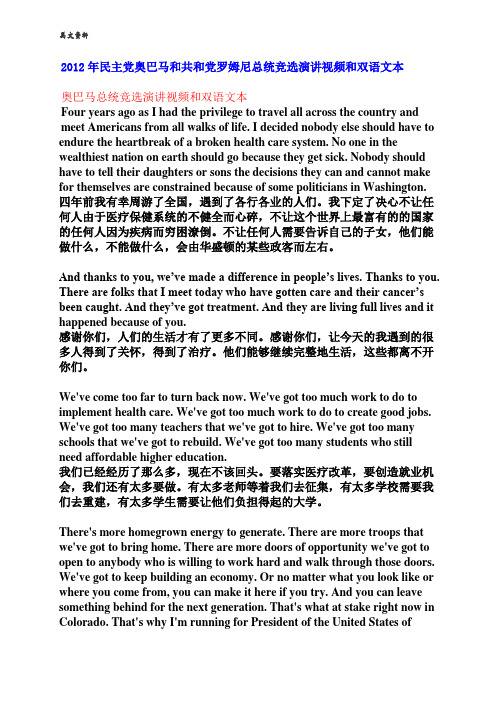
2012年民主党奥巴马和共和党罗姆尼总统竞选演讲视频和双语文本奥巴马总统竞选演讲视频和双语文本Four years ago as I had the privilege to travel all across the country and meet Americans from all walks of life. I decided nobody else should have to endure the heartbreak of a broken health care system. No one in the wealthiest nation on earth should go because they get sick. Nobody should have to tell their daughters or sons the decisions they can and cannot make for themselves are constrained because of some politicians in Washington. 四年前我有幸周游了全国,遇到了各行各业的人们。
我下定了决心不让任何人由于医疗保健系统的不健全而心碎,不让这个世界上最富有的的国家的任何人因为疾病而穷困潦倒。
不让任何人需要告诉自己的子女,他们能做什么,不能做什么,会由华盛顿的某些政客而左右。
And thanks to you, we’ve made a difference in people’s lives. Thanks to you. There are folks that I meet today who have gotten care and their cancer’s been caught. And they’ve got treatment. And they are living full lives and it happened because of you.感谢你们,人们的生活才有了更多不同。
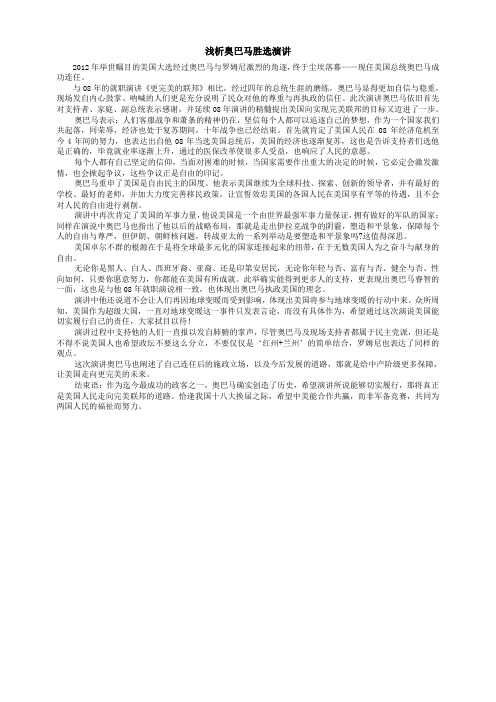
浅析奥巴马胜选演讲2012年举世瞩目的美国大选经过奥巴马与罗姆尼激烈的角逐,终于尘埃落幕——现任美国总统奥巴马成功连任。
与08年的就职演讲《更完美的联邦》相比,经过四年的总统生涯的磨练,奥巴马显得更加自信与稳重,现场发自内心鼓掌、呐喊的人们更是充分说明了民众对他的尊重与再执政的信任。
此次演讲奥巴马依旧首先对支持者、家庭、副总统表示感谢,并延续08年演讲的精髓提出美国向实现完美联邦的目标又迈进了一步。
奥巴马表示:人们客服战争和萧条的精神仍在,坚信每个人都可以追逐自己的梦想,作为一个国家我们共起落,同荣辱,经济也处于复苏期间,十年战争也已经结束。
首先就肯定了美国人民在08年经济危机至今4年间的努力,也表达出自他08年当选美国总统后,美国的经济也逐渐复苏,这也是告诉支持者们选他是正确的,毕竟就业率逐渐上升,通过的医保改革使很多人受益,也响应了人民的意愿。
每个人都有自己坚定的信仰,当面对困难的时候,当国家需要作出重大的决定的时候,它必定会激发激情,也会掀起争议,这些争议正是自由的印记。
奥巴马重申了美国是自由民主的国度。
他表示美国继续为全球科技、探索、创新的领导者,并有最好的学校、最好的老师,并加大力度完善移民政策,让宣誓效忠美国的各国人民在美国享有平等的待遇,且不会对人民的自由进行剥削。
演讲中再次肯定了美国的军事力量,他说美国是一个由世界最强军事力量保证,拥有做好的军队的国家;同样在演说中奥巴马也指出了他以后的战略布局,那就是走出伊拉克战争的阴霾,塑造和平景象,保障每个人的自由与尊严,但伊朗、朝鲜核问题,转战亚太的一系列举动是要塑造和平景象吗?这值得深思。
美国卓尔不群的根源在于是将全球最多元化的国家连接起来的纽带,在于无数美国人为之奋斗与献身的自由。
无论你是黑人、白人、西班牙裔、亚裔、还是印第安居民,无论你年轻与否、富有与否、健全与否、性向如何,只要你愿意努力,你都能在美国有所成就。
此举确实能得到更多人的支持,更表现出奥巴马睿智的一面,这也是与他08年就职演说相一致,也体现出奥巴马执政美国的理念。
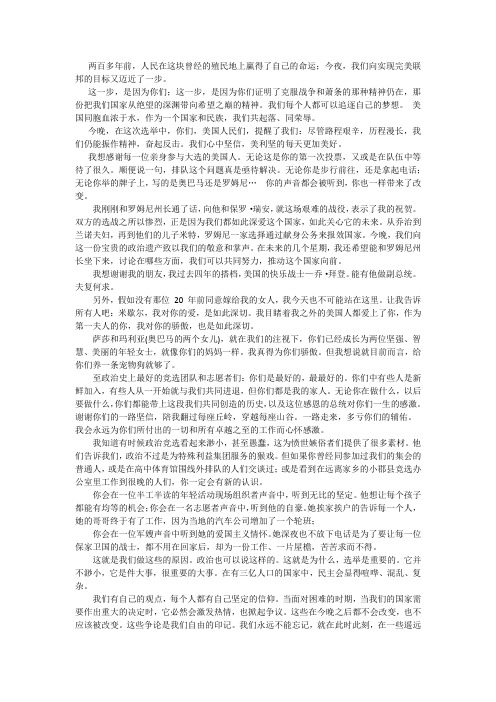
两百多年前,人民在这块曾经的殖民地上赢得了自己的命运;今夜,我们向实现完美联邦的目标又迈近了一步。
这一步,是因为你们;这一步,是因为你们证明了克服战争和萧条的那种精神仍在,那份把我们国家从绝望的深渊带向希望之巅的精神。
我们每个人都可以追逐自己的梦想。
美国同胞血浓于水,作为一个国家和民族,我们共起落、同荣辱。
今晚,在这次选举中,你们,美国人民们,提醒了我们:尽管路程艰辛,历程漫长,我们仍能振作精神,奋起反击。
我们心中坚信,美利坚的每天更加美好。
我想感谢每一位亲身参与大选的美国人。
无论这是你的第一次投票,又或是在队伍中等待了很久。
顺便说一句,排队这个问题真是亟待解决。
无论你是步行前往,还是拿起电话;无论你举的牌子上,写的是奥巴马还是罗姆尼…你的声音都会被听到,你也一样带来了改变。
我刚刚和罗姆尼州长通了话,向他和保罗·瑞安,就这场艰难的战役,表示了我的祝贺。
双方的选战之所以惨烈,正是因为我们都如此深爱这个国家,如此关心它的未来。
从乔治到兰诺夫妇,再到他们的儿子米特,罗姆尼一家选择通过献身公务来报效国家。
今晚,我们向这一份宝贵的政治遗产致以我们的敬意和掌声。
在未来的几个星期,我还希望能和罗姆尼州长坐下来,讨论在哪些方面,我们可以共同努力,推动这个国家向前。
我想谢谢我的朋友,我过去四年的搭档,美国的快乐战士—乔·拜登。
能有他做副总统。
夫复何求。
另外,假如没有那位20 年前同意嫁给我的女人,我今天也不可能站在这里。
让我告诉所有人吧:米歇尔,我对你的爱,是如此深切。
我目睹着我之外的美国人都爱上了你,作为第一夫人的你,我对你的骄傲,也是如此深切。
萨莎和玛利亚(奥巴马的两个女儿),就在我们的注视下,你们已经成长为两位坚强、智慧、美丽的年轻女士,就像你们的妈妈一样。
我真得为你们骄傲。
但我想说就目前而言,给你们养一条宠物狗就够了。
至政治史上最好的竞选团队和志愿者们:你们是最好的,最最好的。
你们中有些人是新鲜加入,有些人从一开始就与我们共同进退,但你们都是我的家人。
以下为奥巴马演讲全文:谢谢,非常感谢。
200多年前,美国第一个殖民地掌握了自己的命运,开始了这个国家的前进之旅。
美国的前进都是因为你们。
因为你们不断重申那种帮助我们在过去战胜了战事及经济颓势的精神。
这种精神将我们的国家拖出绝望的深渊,将其推向希望的彼岸。
我们始终相信:每一个人都可以追求自己的梦想;美国是一个大家庭;团结起来我们就能胜利,分裂只能导致我们失败。
今夜,在这场选举中,你们提醒我们:尽管我们的道路漫长而艰巨,但是我们已经重塑信心,予以反击。
我们在内心中深深的知道最棒的美国将要来临。
我想感谢每一位参与选举的美国民众。
不管你是从第一天就投票了,还是一直等待了很长的时间才投的票(当然了,我们要解决这个排队投票的问题);不管你是自己去投票点投的票,还是打电话投的票;不管你是投了给我,还是投给罗姆尼;你的声音都被大家听到了,并且你对我们国家做出了某些改变。
刚刚我跟罗姆尼通了电话,我祝贺他和保罗在这个艰苦卓绝的战役中所取得的胜利。
我们这场战役十分激烈,但是这正是因为我们深爱着这个国家,并且我们十分在意它的未来。
罗姆尼的整个家庭,孙子辈,孩子辈,都通过公共服务在支持着美国。
我们应该在今晚对这种精神表示尊敬和赞扬。
未来这几周我也希望和罗姆尼一起来讨论怎样使我们的国家不断前进。
我要感谢我过去四年的朋友和搭档——美国的快乐战士、美国历史上最好的副总统:乔-拜登。
当然,如果没有20年前跟我结婚的妻子,今天我就不会站在这里。
我要跟大家说,米歇尔,我比以前更加爱你,我更加自豪,因为我看到全国人民也十分热爱你这位第一夫人,我感到十分自豪。
萨沙,玛利亚,在我们大家的眼里,你们一天天在成长,如今已经出落成了像你们妈妈一样坚强、美丽、有才华的年轻人,我也为你们感到骄傲。
但是目前我觉得给你们养一条宠物狗就够了。
我还要感谢我的竞选团队和志愿者,你们是历史上最棒的。
你们当中有的人是新来的,有的人从一开始就一直伴我左右。
你们都是我的家人。
总统战奥巴马完胜:细数罗姆尼战败的失误总统战,细节决定成败。
难看的经济数据始终是奥巴马的“阿喀琉斯之踵”,但即使如此,罗姆尼仍然没能抓住机会,而是一错再错,最终积重难返,一败涂地。
那么,罗姆尼到底犯了哪些错误呢?错误之一:以毒攻毒执政四年并没有交出一份合格的成绩单,奥巴马对此当然是心知肚明,因此,其选战策略就定为:为自己并不理想的政绩辩护并猛攻罗姆尼。
“四年前,你们和我一起开始一段旅程……我们走到一起,因为我们相信,在美国,你的成功不应该由你的出身情况来决定。
”2012年5月5日,在俄亥俄州和弗吉尼亚州,奥巴马以相同的开场白拉开了首轮竞选集会的序幕。
这是两个精心挑选的地点,因为俄亥俄州和弗吉尼亚州在美国是公认的关键“摇摆州”,对选举具有至关重要的要影响。
以俄亥俄州为例,自1904年以来,美国共举行了27届总统选举,其中25位赢得该州选举胜利的候选人最后都成功当选总统,2008年的奥巴马同样如此。
而弗吉尼亚州则是共和党的传统票仓,自上世纪70年代起,共和党总统候选人均在该州获胜,直到2008年奥巴马打破了这一“魔咒”,赢得该州胜利。
在两场演讲中,奥巴马分别5次提到罗姆尼,他提醒选民说:选择罗姆尼就是历史的倒退,因为他代表富人和金融财团的利益,与中产阶级的利益脱节,更不会对金融机构采取有力监管;选择罗姆尼,就意味着美国人民对四年前选择的自我否定。
奥巴马抨击下的罗姆尼完全是一副奸商的嘴脸,为了实现利润最大化而不择手段,甚至为此而逃税、打压工会……而作为挑战者,面对奥巴马的死缠烂打,罗姆尼选择了一个错误的竞选策略——以毒攻毒,攻击奥巴马。
2012年8月31日,罗姆尼,在共和党全国代表大会发表的提名演讲就是一个明确的信号。
罗姆尼在共和党大会上的演讲我很荣幸地向大家介绍,美国的下一届总统,米特〃罗姆尼!主席先生,各位代表,我接受你们授予我竞选美国总统的提名。
如果你当初投票给奥巴马时感到无比兴奋,那么现在他真的做了总统,难道你不该感到更兴奋么?你应该明白,如果你对他感觉最好的时候是是投票的那天,那作为总统,他的工作一定是出了什么问题。
奥巴马与罗姆尼背后的财团对比,奥巴马的金主甘拜下风!奥巴马与罗姆尼背后的财团对比,奥巴马的金主甘拜下风!美国总统大选刚刚落下帷幕,奥巴马赢得续任四年的机会。
然而总统选举从来都是劳民伤财的事情,至于具体参选一次总统要花多少钱?我们可以用数字直观表示。
比如这次奥巴马和罗姆尼之争,我们只能感慨,罗姆尼不愧是搞金融出身的,真的不差钱啊!竞选一次总统10亿多美元的银子就打了水漂。
这点连奥巴马也甘拜下风。
看完了两人的总花费之后,我们再来关注一下两位候选人背后的20大金主。
他们真是肯下血本,动辄百万银子砸进去。
从总数上来看,这一轮罗姆尼又略胜一筹,前20金主总共贡献资金比奥巴马多出66.8万美元,达到近1千万美元。
另外从金主名单中不难看到,奥巴马与罗姆尼之争,其实就是学校+科技公司和金融公司的竞争!奥巴马的20位金主全部来自知名大学、科技巨头,政府以及医疗和律所。
而罗姆尼呢?几乎华尔街所有的大银行统统都搬这里来了。
有意思的是,有些“墙头草”的金主为了双重保险,两边都有下赌注。
比如富国银行,德勤。
但是从对两者的捐款数量上看,明显还是对罗姆尼偏心较多。
这个投资list是对的,但事实上。
明明是奥巴马更能获得捐款如果能看英文,请看这个CNN的统计,这是我看到整个竞选过程里最牛逼的一个图表/election/2012/campaign-tracker/捐款数额,也就是你第一行的数额,跟CNN的表格是一致的,奥巴马6.3亿,罗姆尼3.8亿。
这个数据为啥是奥巴马甘拜下风了?你表格里总花费奥巴马9.3亿,罗姆尼10.2亿,这到底怎么出来的?第二行的花费是怎么回事,最后的总花费又是怎么回事,请把各项定义说明吧,至少。
而且,这top20的总额只占总捐款额的1%,还差距这么小,从数理统计的角度看彻底没任何意义。
因为相比共和党的保守主义倾向,民主党是典型的自由主义的政治倾向,而以科技为主导的硅谷在西海岸,西海岸又是自由主义民主党的铁杆阵营根据地,东部以纽约和芝加哥为核心的几个州也是民主党的主要文化根据地和铁杆阵营。
Obama and Romney indulge in debatable accusationsUS presidential campaign again targets China, Chen Weihua reports in New York.When President Barack Obama and Republican challenger Mitt Romney faced off in the second presidential debate on Tuesday, both grabbed every opportunity to display a tough stance on China.US Republican presidential nominee Mitt Romney and US President Barack Obama during the second presidential debate in New York.[Mike Segar / REUTERS]China was mentioned dozens of times during the 90-minute debate, with questions from the audience covering both domestic and foreign policy, ranging from jobs, taxes and immigration to energy, gun control and equal opportunities for women.Only the first reference to China, by Obama, was positive, when the president accused Romney of not having a clean-energy plan."China and Germany are making these investments (in clean energy)," said Obama, who appeared much more aggressive and confident than during his performance in the first debate.In outlining hisfive-point economicplan, Romney said hewill expand trade withLatin America,"cracking down on Chinawhen they cheat." Thepresidential hopefulhas used those wordsrepeatedly during thecampaign."I will crack down onChina. President Bushdidn't," said Romney, inanswer to a question onthe differences betweenhimself and Obama'spredecessor George W.Bush.Obama hit back immediately: "When he talks about getting tough on China, keep in mind that Governor Romney invested in companies that were pioneers in outsourcing to China. Governor, you are the last person who's going to be tough on China."The president then touted his tough stand on China, saying that his administration has brought twice as many cases against alleged unfair trade practices than the previous administration. "We won every single one that has been decided," he said.Obama then blasted Romney for calling him a "protectionist" after the imposition of punitive tariffs on Chinese tires more than two years ago. "We saved thousands of jobs," he said.However, the president didn't mention that the cost of tires has risen since the tariffs were introduced.Romney refuted Obama's allegations that he has invested in Chinese companies. He said many of his investments have been managed by blind trusts during the past eight years. "Mr. President, have you looked at your pension? You also have investments in Chinese companies, investments outside the United States," said Romney.The fiercest attacks on China came when both candidates were asked about outsourcing of US jobs.While saying China is now the world's largest manufacturing nation, a position formerly held by the US, Romney said that when the US trades with other nations, it has to ensure that those nations play by the rules."And China hasn't," he said, accusing China of artificially undervaluing the yuan."China has been a currency manipulator for years and years. And the president has had regular opportunities to label China as a currency manipulator, but he refuses to do so," said Romney."On Day One, I will label China a currency manipulator, which will allow me as president to be able to put in place, if necessary, tariffs where I believe that they are taking unfair advantage of our manufacturers," Romney said."China has been cheating over the years. One, by holding down the value of their currency and two, by stealing our intellectual property —our designs, our patents, our technology," said the former Massachusetts governor."There's even an Apple store in China that's a counterfeit Apple store, selling counterfeit goods. They hack into our computers," claimed Romney.Obama argued that, under the pressure from his administration, the Chinese currency actually has risen 11 percent. "We have put unprecedented trade pressure on China, that's why exports have significantly increased during my presidency," he said."Currency manipulator"The frequency with which China was mentioned may have surprised those watching and listening to the debate, but the subject has engaged both candidates since the start of the campaign.During a debate in New Hampshire 12 months ago, Romney claimed that he would sign an executive order on his first day in office, identifying China as a currency manipulator.But that stance was criticized by Romney's fellow Republican, the former US ambassador to China, Jon Huntsman, who said he did not subscribe to Romney's view on international trade. "I don't want to find us in a trade war," he said.The Chinese currency is now only undervalued by about 7 percent, compared with the 40 percent figure suggested two years ago, according to a report from the Peterson Institute for International Economics in Washington four months ago.With China's currency rising by 30 percent since 2005 and the narrowing current account surplus, experts believe it does not make sense to pressure China for greater appreciation.On Friday, the US Treasury Department delayed its report on the exchange rate policies of its trading partners until after a meeting of G20 finance ministers and central bank leaders next month.While Romney and his running mate Paul Ryan took the opportunity to attack Obama's policy on the yuan during weekend campaigning in Ohio, some US companies, such as GE and Caterpillar, have been overwhelmingly supportive of Obama's decision not to label China a currency manipulator.Even Marco Rubio, the Republican Senator from Florida who introduced Romney at the Republican National Convention in August, told Bloomberg News on Tuesday that he does not think it would be a good idea for Romney to label China a currency manipulator. "It could kick off a trade war that would be bad for the economy," he said.China is now the fastest-growing export market for the US and its third-largest export market, trailing only Canada and Mexico.Some experts said that while a large number of observers don't expect Romney to keep his promise if elected, some were concerned that he may be forced to do so to avoid attacks for breaking his promise.Richard Bush, director of the Center for Northeast Asian Policy Studies at the Brookings Institution, said Romney will back off from the campaign pledge if he is elected.Sun Zhe, director of the center for US-China relations at Tsinghua University, said Romney had taken "an extreme stance" toward China in the debate, which was "irresponsible" and would not work in practice, but might gain some votes."Neither Obama nor Romney will fulfill their campaign promises (on China) once elected, or there would be a trade war that would hurt both sides," said Guo Xiangang, a researcher into US studies at the China Institute of International Studies.Negative campaigningThe showdown over who will be tougher on China mirrors countless campaign ads aired across the US during the last six months, especially in swing states such as Ohio, North Carolina and Florida.China was the focus of 10 district ads from both Obama and Romney, according to the Campaign Media Analysis Group at Kantar Media. The ads ran 47,190 times over a 30-day period, ending Oct 8.The seven Romney ads that mentioned China were broadcast 29,317 times, while Obama's three ads on China were broadcast 17,873 times. In them, Romney was accused offunneling US jobs to China through Bain Capital, the private-equity outfit that he co-founded in 1984.Romney's ads repeatedly referred to China as a cheat. In one, called "Stand up to China," it was alleged that, "China is stealing American ideas and technology. Seven times Obama could have taken action, seven times he said no. His policies cost us 2 million jobs."The belligerent campaign rhetoric has caused concern among some observers of US-China relations, regarded by many as the most important bilateral relationship of the 21st century."We must ask our leaders to abandon the campaign rhetoric and focus instead on a future of shared prosperity and cooperation," said Steve Orlins, president of the National Committee on United States-China Relations, at the committee's annual gala on Oct 8.Henry Kissinger, a former secretary of state, who endorsed Romney, said on Oct 3 that he was "bothered" that both campaigns are "appealing to those suspicious of China" in order to win votes. The architect of modern Sino-US relations also criticized the candidates for using "extremely deplorable" language in describing China as a cheat."The sort of China-bashing in the presidential contest may be the strongest since the two countries began to restore ties in 1972. One reason is that China's greater economic clout stands out even more during the longest American downturn since the Great Depression," according to an editorial in the Christian Science Monitor.Sun said frictions between the two countries, including the exchange rate issue and the protection of intellectual property, have increased as economic ties grow closer and more intertwined."These problems can only be resolved through dialogue and negotiation," he said.China has actually helped to sustain political stability in the US, said Sun, adding that inexpensive Chinese exports have benefited the poor in the US.OutsourcingWith US unemployment at more than 8 percent, the candidates have accused each other of outsourcing jobs to China.Obama has repeatedly attacked Bain Capital as a pioneer of outsourcing, while Romney blames Obama for sending millions of jobs to China and India during the past four years.Michael Tanner, a senior fellow at the Cato Institute in Washington, said there will be less negative talk about outsourcing after the election. "I think they know outsourcing is inevitable. No one can stop it. This (stance) is mostly for election consumption," he said."We can't and shouldn't try to keep jobs that are not cost-effective in the United States. In China, some jobs are going to cheaper countries such as Vietnam," he added in response to Obama's campaign promise to give tax breaks to US companies that keep jobs at home.Meanwhile, Jagdish Bhagwati, professor of economics and law at Columbia University, has repeatedly criticized Obama's outsourcing rhetoric. "The United States under the Obama administration has clearly shown that it's open to protectionism," he said."He (Obama) is beginning to sound like Lou Dobbs," said Bhagwati, referring to the Fox Business Network host known for his on-air rants against US companies that outsource jobs.Positive notesWhile US politicians have often criticized China for stealing jobs, a recent study by Rhodium Group in New York showed that the 600 Chinese direct investment transactions made in the US between 2000 and 2012 support 27,000 jobs today compared with 10,000 five years ago. And the figure does not include indirect job creation or the jobs created by US companies with minority Chinese investment.The report also predicted that if the US can attract $150 billion of Chinese outbound foreign direct investment by 2020, 300,000 US citizens will on the payroll of Sino-US affiliates. Rhodium expects total Chinese outbound FDI to hit $1 trillion to $2 trillion by 2020.Japanese companies created very few jobs for US citizens in the 1980s, but now they employ 700,000, according to the report.Meanwhile at a local level, US state governors and city mayors have been pragmatic, making frequent visits to China to court investment.Michael Bell, the mayor of Toledo, Ohio, one of the election's key battleground states, said recently that he sees advantages in the relationships Toledo is building with China."Last weekend I was in Chicago, I was watching the city of Wuhan making business deals with Chicago. And I'm watching other places throughout the United States creating businesses with China," he said.Meanwhile, Steve Orlins believed the US election and China's 18th Party Congress, both scheduled for early November, will present the leaders of both countries with a unique opportunity to reset the bilateral relationship, by focusing on solutions rather than the legacy of 20th century conflict."We must ask our leaders to abandon the campaign rhetoric and focus instead on a future of shared prosperity and cooperation," he said.Contact the reporter at chenweihua@Tan Yingzi in Washington, Ariel Tung in New York, Deng Zhangyu and Cheng Guangjin in Beijing contributed to this story.。